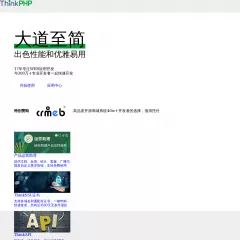ThinkPHP 
ThinkPHP is used by 0.04% of sites
Official Website
http://www.thinkphp.cnCategory
Web Frameworks
ThinkPHP is a popular PHP framework used for developing web applications. It follows the Model-View-Controller (MVC) architectural pattern and provides a set of libraries and tools that simplify the development process.
Here are some key features and characteristics of ThinkPHP:
MVC Architecture: ThinkPHP follows the MVC pattern, which separates the application logic into three components: the model, the view, and the controller. This separation allows for better organization and maintainability of code.
Convention over Configuration: ThinkPHP follows the principle of "convention over configuration," which means that it provides sensible defaults and conventions that reduce the need for manual configuration. This helps developers get started quickly and minimizes repetitive tasks.
Database Support: ThinkPHP offers built-in support for working with databases. It provides an Object-Relational Mapping (ORM) system that simplifies database interactions by mapping database tables to PHP objects. This makes it easier to perform common database operations without writing raw SQL queries.
Caching: ThinkPHP includes caching mechanisms that help improve the performance of web applications. It supports various caching strategies, such as file-based caching, memory caching, and Redis caching, which can be used to store frequently accessed data and reduce database queries.
Template Engine: ThinkPHP includes a template engine called "ThinkTemplate," which allows developers to separate the presentation logic from the application's business logic. The template engine provides a simple syntax for rendering views and supports features like template inheritance and variable substitution.
Request and Response Handling: ThinkPHP provides a robust mechanism for handling HTTP requests and generating responses. It offers features like routing, input validation, and response formatting, which make it easier to build RESTful APIs or traditional web applications.
Extensibility and Community: ThinkPHP has a thriving community of developers who contribute to its ecosystem by building extensions and plugins. These extensions can be used to add additional functionality to your applications, such as authentication, authorization, and third-party integrations.
ThinkPHP has gained popularity in the PHP development community due to its simplicity, performance, and feature-rich nature. It is well-documented and provides comprehensive documentation, tutorials, and examples to help developers get started with the framework.
Here are some key features and characteristics of ThinkPHP:
MVC Architecture: ThinkPHP follows the MVC pattern, which separates the application logic into three components: the model, the view, and the controller. This separation allows for better organization and maintainability of code.
Convention over Configuration: ThinkPHP follows the principle of "convention over configuration," which means that it provides sensible defaults and conventions that reduce the need for manual configuration. This helps developers get started quickly and minimizes repetitive tasks.
Database Support: ThinkPHP offers built-in support for working with databases. It provides an Object-Relational Mapping (ORM) system that simplifies database interactions by mapping database tables to PHP objects. This makes it easier to perform common database operations without writing raw SQL queries.
Caching: ThinkPHP includes caching mechanisms that help improve the performance of web applications. It supports various caching strategies, such as file-based caching, memory caching, and Redis caching, which can be used to store frequently accessed data and reduce database queries.
Template Engine: ThinkPHP includes a template engine called "ThinkTemplate," which allows developers to separate the presentation logic from the application's business logic. The template engine provides a simple syntax for rendering views and supports features like template inheritance and variable substitution.
Request and Response Handling: ThinkPHP provides a robust mechanism for handling HTTP requests and generating responses. It offers features like routing, input validation, and response formatting, which make it easier to build RESTful APIs or traditional web applications.
Extensibility and Community: ThinkPHP has a thriving community of developers who contribute to its ecosystem by building extensions and plugins. These extensions can be used to add additional functionality to your applications, such as authentication, authorization, and third-party integrations.
ThinkPHP has gained popularity in the PHP development community due to its simplicity, performance, and feature-rich nature. It is well-documented and provides comprehensive documentation, tutorials, and examples to help developers get started with the framework.